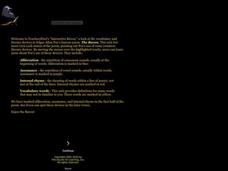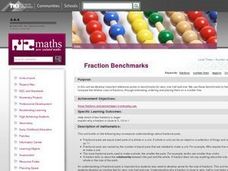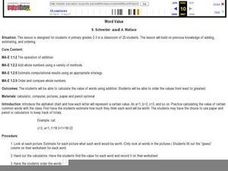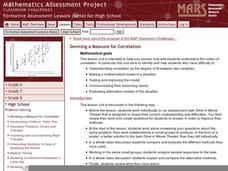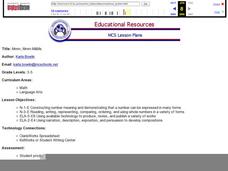Science Matters
Richter Scale
The 12th instructional activity in a series of 20 opens with a demonstration of exponential functions using pasta. This concept is connected to the Richter Scale, which is also an exponential function. Scholars compare the exponential...
Curated OER
Multiplication: Bugs Can Multiply, So Can I!
Develop multiplication skills with your class. Youngsters will visualize multiplication as repeated addition. Then they will create a multiplication bug book and discover arrays as a strategy for multiplication problem solving....
University of Colorado
Are All Asteroids' Surfaces the Same Age?
Did you know scientists can tell the age of an asteroid by looking closely at its craters? This final lesson of a six-part series focuses on two asteroids, Gaspra and Ida, in order to demonstrate the concept of dating asteroids. Scholars...
Curated OER
Comparing Fractions with the Same Numerators, Assessment Variation
Have your class demonstrate their ability to compare fractions with this short multiple-choice assessment. Using the fractions 9/8 and 9/4, the students first make comparisons using both words and the greater than/less than signs. Next,...
02 x 02 Worksheets
Inverse Variation
Discover an inverse variation pattern. A simple lesson plan design allows learners to explore a nonlinear pattern. Scholars analyze a distance, speed, and time relationship through tables and graphs. Eventually, they write an equation to...
Curated OER
Fraction Benchmarks
Learners investigate the fraction benchmarks for zero, one half, and one. They use these benchmarks to compare the relative sizes of fractions, through estimating, ordering and placing them on a number line. An assessment worksheet is...
Curated OER
Word Value
Students investigate the concepts of adding, estimating, and ordering. The lesson uses the alphabet as an example illustration. The students practice the calculations in class in order to ensure mastery.
Curated OER
Teddy Bears and Friends
Children begin by making direct comparisons between objects and putting a number of objects into order according to length. They are also introduced to measuring with multi-link cubes which allows them to compare objects which cannot be...
Manchester University
Lesson 51: Scientific Notation
Discuss scientific notation with this mathematics lesson. Middle schoolers predict which problem is bigger of two numbers. They analyze the problems by observing the powers of 10 in order to decide which is bigger. This appears to be an...
Curated OER
Worksheet Chapter 1 College Prep Algebra
In this algebra worksheet, students compare integers, translate words to a numerical expression, identify sets of numbers, identify properties, use order of operations, multiply fractions, and solve simple word problems. This 13 page...
Curated OER
Estimate, Solve, and Check
Young scholars estimate, solve, and check a series of addition and subtraction number and word problems. They write their estimates on a recording sheet, compute and write the answer in the next column, and check their answer with a...
Curated OER
Devising a Measure for Correlation
How well does your class understand the concept of correlation? Use an activity to explore different methods of calculating correlation. Working alone and then in groups, your class will make decisions on what math to apply to the...
Curated OER
Gifts from Grandma, Variation 1
Composed of three word problems, this math activity exposes young mathematicians to relationships present in multiplication and division. The first problem is most useful with a tape diagram in which learners are working with equal-sized...
Curated OER
Multiplying Polynomials
Students explore multiplying polynomials. They observe solving polynomials using the standard order of operations, FOIL, and the box method. Throughout the demonstration, students explore strategies of solving word problems such as...
Curated OER
How Big Is Your Head?
Students explore measurement by measuring classmates' heads. They record their measurements and they put the measurements in order from smallest to largest. Students figure the mean, median, mode, maximum, minimum, and range of their...
Curated OER
Subtracting With or Without Regrouping - Lesson & Worksheet
Second graders analyze subtraction problems. In this subtraction instructional activity, 2nd graders examine how to subtract numbers with and without regrouping. Students work in teams to complete board races. Assessment is provided.
Curated OER
Mmm, Mmm, M&M's
Here is another version of the classic M&M math lesson. In this one, upper graders utilize the ClarisWorks Spreadsheet program in order to document the data they come up with from their bags of M&M's. After making their initial...
Curated OER
The Tortoise And The Hare
Students use the children's story of The Tortoise And The Hare in order to investigate the graphing of equations. The story is converted to an algebraic word problem for them to solve. Students investigate the relationships of data and...
Curated OER
Investigation - Dividing a Candy Bar
Fourth graders explore dividing equally. They divide three-digit divisors by one and two digit divisors. Students work real life division problems. They examine possible solutions to each problem.
Curated OER
Flash Fractions 3
Love this! Kids play to practice determining which fraction is larger. Each set of fractions are represented in numeric form as well as how they appear on a fraction circle. This is a great way to show learners the differences between...
Curated OER
Line With Printmaking
Third graders investigate the use of lines in different pieces of art by creating their own ink print. In this art analysis instructional activity, 3rd graders identify the contours and lines of natural objects such as twigs and...
Curated OER
Complexity Madness
After introducing the concept and formula for finding the area of a square, try this lesson. Fifth graders will use their prior knowledge to break apart various shapes in order to determine area. This lesson includes several examples,...
Illustrative Mathematics
Voting for Two, Variation 2
John won the election, but by how much more? Your learners will calculate how many votes each candidate received in order to determine the difference. Use with other lessons provided in the series to practice different variations of this...
Curated OER
Just the Facts! Exploring Order of Operations and Properties of Real Numbers
Sixth graders explore the concept of order of operations. In this order of operations lesson, 6th graders view a powerpoint about order of operations in society. Students post on a blog about order of operations.



